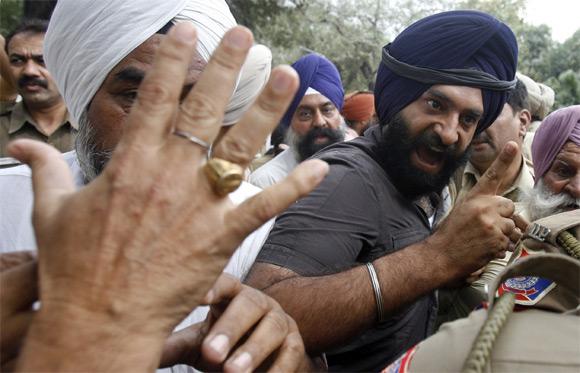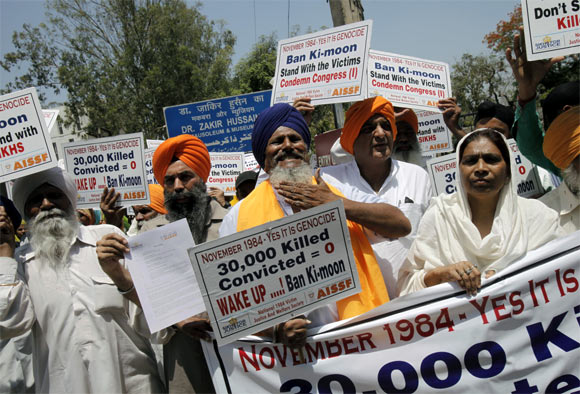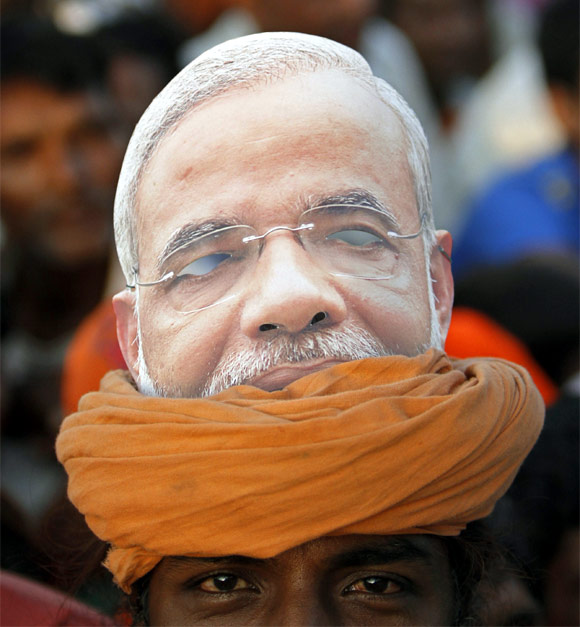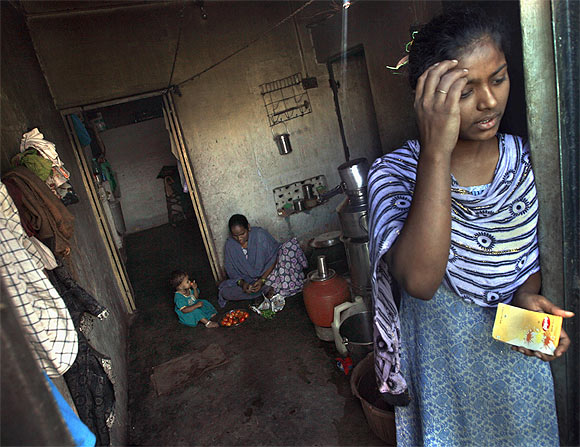 | « Back to article | Print this article |
It's STUPID to use 1984 riots to defend Modi
Of all the many arguments in Indian politics that are stupid, hypocritical and wrong -- and there are many -- the one exculpating Modi because of 1984 is the most dangerous, says Mihir S Sharma
Last week, a Delhi court told the police to work a little harder to frame a case against Jagdish Tytler, the Congress leader accused of leading anti-Sikh rioters in 1984. Another such leader, Sajjan Kumar, is likely to face something similar in the coming week.
Proper investigation of 1984, in which loose ends like "lost" witnesses and unchecked statements don't exist, is long overdue. That not one mob leader has yet been convicted, and that Tytler hasn't even been charge-sheeted in the 28 years since 1984, is a disgrace. Perhaps the courts need to supervise the investigations more closely, to minimise any continuing political interference.
This news, sharpening memories of the lack of accountability for 1984, comes at a time when a particular argument has gathered particular force. Two or so years ago, a conversation about the 2002 Gujarat riots could be had without someone invoking 1984.
Since then, though, as more people look to smoothen Narendra Modi's ascent to Delhi, both riots are always mentioned simultaneously.
On one level, a comparison makes sense. Both were clearly state-sanctioned and allegedly involved politicians leading mobs. In neither case were those in charge held accountable for their active dereliction of their duty -- and went on to win elections not-so-subtly on the back of the polarisation they achieved.
Click on NEXT for more...
Tytler or Kumar will not be given tickets
In both cases, investigations into the roles of the powerful appeared to have been tampered with, though in the case of 2002, the courts did at least ensure that some cases were followed up properly, something that they are only beginning to do now with 1984.
It is, however, with the other part of the argument that I have something of a problem. And this is the "What about...?" question. Essentially, the culpability of some senior Congress leaders in 1984 -- whether direct or indirect -- is used to argue that 2002 shouldn't stand in the way of Modi becoming prime minister.
This is stupid, hypocritical and wrong.
It is stupid because, first, Rajiv Gandhi is not standing for prime minister. Nor is the man who, as home minister, controlled the Delhi police force in 1984, P V Narasimha Rao, very likely to be named prime minister. Nor are Tytler or Kumar going to be given Congress tickets, as was settled in 2009.
However, the equivalent individual to Gandhi and Rao, Modi, is not just around but being feted. If the Bharatiya Janata Party is not collectively and forever responsible for 2002 to the degree of being an unacceptable party of government, the Congress can not be for 1984 (or the Left for Nandigram, and so on).
So to claim that there is an equivalence between the man who presided over one riots and the party in power during the other is so very illogical that one wonders, mystified, how many brain cells very intelligent people have to suspend the operation of in order to say it.
Click on NEXT for more...
Modi's politics is still the politics of exclusion
It is also hypocritical, because you cannot attack Gandhi for 1984 while simultaneously defending Modi, or vice versa. You have to at least apply the same standards. Yes, Gandhi, because of the events that surrounded his swearing-in, did not deserve the adulation he was showered with in the early part of his term (and under this hopelessly sycophantic government).
He never apologised for the riots; he never withdrew the "when a tree falls, the ground shakes" argument that callously minimised his government's culpability and the lives lost.
More, his party ran a cynical election campaign in 1984 that included newspaper advertisements with pictures of turbaned men behind barbed wire. Because of 1984, a better country would take back his Bharat Ratna, and rechristen every last stone it has named for him. But if you believe any of that, you have to at least apply the same standards to Modi -- which most "What-about-1984ers" do not do.
Finally, it is wrong to make the "What about 1984...." argument, because it is difficult to sustain the argument that the Congress of 2013 is anti-Sikh. It is not at all difficult to sustain the argument, however, that the BJP under a dictatorial Narendra Modi would be anti-Muslim.
Modi has not only not apologised for 2002, or "bowed his head in shame" like the Congress' Sikh prime minister did in 2005, but he continues to actively be supported by many precisely for what he did in 2002, and he himself defends his actions and the "reactions" of the mobs.
His politics is still the politics of exclusion; his shining Gujarat has passed Muslim ghettoes by, or so its residents assert. (I direct you to Zahir Janmohamed's excellent post on Kafila, if you don't believe that.)
Click on NEXT for more...
We are picking a PM now
Gandhi, although he does not deserve sympathy given his ghastly inaction in 1984, did at least go out of his way to sign an accord with Sant Longowal, hardly a sarkaari Sardar.
Modi, instead, had a sadbhavna yatra during which he tried to bribe or appropriate Muslims onto stage with him without once demonstrating the slightest real generosity of spirit.
Sadly, even the Tytler we saw defending himself on TV appeared a more credible protector of the rights of those who identify with a religious minority than does Modi.
And in the end, we are picking a prime minister now. Not in 1984. So to say that, because an entire generation -- to its abiding shame -- chose to overlook Gandhi's responsibility in the 1980s, we should do the same today and hope for the best is, well, wrong.
So wrong that those making it are either cynical -- or so hopeful that they go all the way around to cynical again.
Of all the many arguments in Indian politics that are stupid, hypocritical and wrong -- and there are many -- the one exculpating Modi because of 1984 is the most dangerous.
Click on NEXT for more...
TOP photo features of the week
Click on MORE to see another set of PHOTO features...





